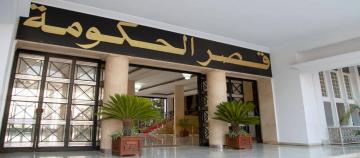
The Government on Wednesday held a meeting chaired by Prime Minister Noureddine Bedoui to hear and discuss two presentations on the return to for work, school and university, as well as the measures to reduce the balance of payments deficit in order to preserve the country's foreign exchange reserves, the Prime Ministry's Office said in a communiqué.
During a detailed presentation on the progress of preparations for the start of the new school year next month, made by the ministers of the Interior, Education, Higher Education, Vocational Training and Housing, the participants discussed the measures taken to prepare for the new academic and vocational training year, in addition to environmental cleanliness, public health and hygiene, as well as preparations for the autumn and winter seasons.
An unprecedented number of educational facilities have been received or are due to be inaugurated at the start of this academic year, namely 656 new schools, including 426 primary schools, 137 middle schools and 93 high schools, pending the delivery of 161 additional schools at the end of 2019.
To ensure the supervision of these new schools, the sector will hire 8,040 employees, including 1,061 teachers.
A special effort is made for the province Algiers in order to meet the increase in demand for education facilities following the recent relocation operations.
Concerning the next academic year, a significant improvement is expected in terms of school meals thanks to the opening of 94% of canteens and the reinforcement of school transport through the purchase of 1000 new buses.
The participants also stressed the need to inform students’ parents through the media about the opening of new classes and schools.
For the start of the academic year, 368,000 baccalaureate holders will be received universities where the operation of their orientation under university enrolment takes place in good conditions. More than 90% of baccalaureate holders had their first field choice accepted.
All measures have been taken to welcome new graduates in good conditions, including 83400 seats and 51950 beds, in addition to 3000 job positions in the sector.
The Vocational Education and Training sector will be strengthened by the reception of 34 new institutes with a capacity of more than 15,100 teaching posts, enabling the sector to receive more than 503,000 trainees.
The Health Sector has taken a series of measures to improve health services, particularly in terms of school health.
At the end of this presentation and the ensuing debate, the PM noted the significant progress made in preparing for the next return for work and university, which is the result of the implementation of the special preparatory programme and the decisions taken by the Government.
Bedoui also stressed the need to continue mobilizing all stakeholders and strengthening intersectoral coordination in view of the particular situation facing the country, through dialogue and close action with social partners.
Besides, the ministers of Interior and Water Resources were tasked with an assessment operation to determine the causes of the recent drinking water supply disruptions in some provinces, and to present practical suggestions. The PM decided to dismiss local officials found to be failing in the affected provinces, namely Bouira, Medea, M'sila, Bordj Bou Arreridj and Setif.
The Minister of Finance made a presentation on the measures to be taken to reduce the balance of payments deficit in order to preserve the country's foreign exchange reserves.
The presentation focused on the practical measures taken by the sectors concerned under the implementation of the decisions taken by a Government meeting on 7 August on tertiary regulation for the agriculture and maritime transport sectors, by prioritizing the national maritime fleet in the transport of wheat and milk imports.
The implementation of this decision relies in the signing of an agreement between the Maritime Transport Group (GATMA), the Algerian Inter-professional Cereals Office (OAIC) and the National Interprofessional Milk Office (ONIL), and the purchase of the new vessels remaining in the GATMA group's investment programme and used containers to reduce transport costs.
The presentation also covered the measures taken to rationalize imports and guarantee the strategic stock of common wheat, in particular through the completion of the programme to build wheat silos countrywide and the reorganization of OAIC.
